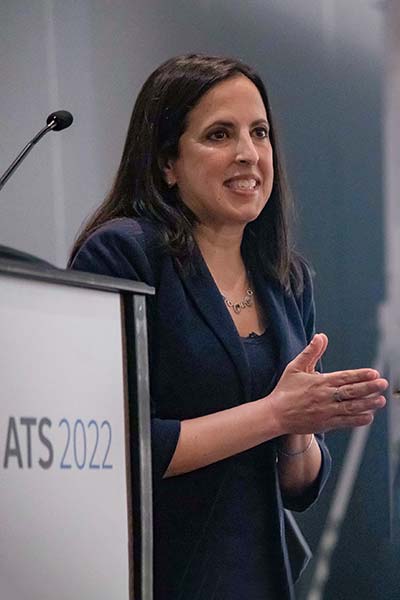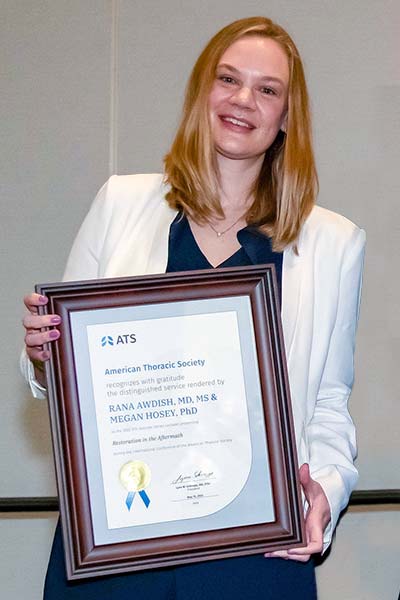Rana Awdish, MD, medical director of care experience for Henry Ford Health, and associate professor of medicine at Wayne State University School of Medicine, and Megan M. Hosey, PhD, assistant professor of physical medicine and rehabilitation at Johns Hopkins School of Medicine, spoke of restoration in the aftermath of the COVID-19 pandemic as the Keynote Series speakers Sunday morning, May 15, at ATS 2022.

Dr. Awdish, who is the author of the critically-acclaimed, best-selling memoir, “In Shock,” based on her own critical illness, opened the presentation by describing one of her patients, a woman with whom she had grown close over 10 years while treating her for lung cancer. Their bond was so close that the woman knitted baby sweaters for Dr. Awdish and had her church pray for the physician while she was sick.
Then COVID-19 struck and one day, the woman appeared in Dr. Awdish’s office again. She rolled her eyes, glared, and pulled down the doctor’s hospital-mandated mask and asked her what she was doing — she as much as anyone should know that COVID-19 is all just a money-making conspiracy.
“And in that moment, she disappeared,” Dr. Awdish said. “She swirled into a haze of guns and flags and co-opted mottos.”
The physician recalled taking a deep breath and explaining that she was protecting herself based on what she’d seen in the ICU. She then opened a discussion that led to the woman telling Dr. Awdish how her son had barred her from seeing her grandchildren, the only thing in the world that mattered to her, because she wasn’t following safety protocols. The patient admitted to feeling abandoned, isolated, and disposable.

“As she spoke, I realized I also felt abandoned, isolated, and disposable,” said Dr. Awdish. “Our grief vibrated between us. It was in a different frequency, but it was recognizable to each other.”
Health care professionals are so used to healing others that they can lose sight of how to care for themselves.
Dr. Awdish has heard colleagues describe COVID-19 as having scarred them, but she prefers to think of them as having been wounded.
“That is a time when we can actively re-examine and rebuild ourselves,” she said. “And so, we pause here to regard our limbs, to consider what we’ve been through, to choose with agency the shape our scar will take, how we will use what we’ve learned to heal our communities. And I know it can be hard to spend any time regarding our own suffering when there is so much suffering around us that we are so busily attending to, but without pausing to heal, we get all of the pain of experience and none of the transformation. We owe it to ourselves to heal.”
Dr. Awdish also spoke of peer processing sessions she attended during the pandemic where a nurse relayed how she was treating a patient in the ICU when he went into cardiac arrest. The nurse was the only person in the room and suddenly felt paralyzed. A half dozen treatments flashed through her head, but she knew from what she’d seen with other COVID-19 patients in this condition that he would die anyway. So, she wondered if she should just stand by and hold his hand.
The nurse also described feeling angry watching the team outside the window meticulously donning their PPE and said it wasn’t right to put her in that position, Dr. Awdish recalled. That’s when a grizzled respiratory therapist began talking about his time in the Vietnam War and how he was part of things that were morally indefensible — because it was a war, he stressed.
“He said that was why they were calling (COVID-19) a war,” Dr. Awdish said. “It was to signal to us that the normal rules were suspended. He said that’s why they’re calling us heroes. That’s what you call people who you force to betray themselves.”
Dr. Awdish also remembered how every person in the peer processing session began reflecting the nurse’s values back to her. They told her that she filled a need that would have otherwise been voided and demonstrated the most important aspects of the nurse’s profession by tending to the patient’s humanity above all else, even her own safety.
Dr. Hosey then took to the stage to tell the story of Steve, a COVID-19 patient who had spent several weeks in the ICU and undergone a lung transplant.
During the midst of pandemic lockdowns and waves of very sick patients, it was easy to see how parts of Steve’s adversity matched that of her and her colleagues, Dr. Hosey said. Many of them felt cut off from their most important coping mechanisms and distanced physically or emotionally from their loved ones.
Meanwhile, Steve was fighting through hours of various therapies, as well as fatigue, pain, and horrible anxiety that each of his symptoms was a harbinger of his impending death. He also missed his family, who he was able to see only virtually and was scared he’d never see them outside of a hospital again.
“We’ve all experienced so many obstacles over the last few years,” Dr. Hosey said. “When I reflect on what’s helped me to get through these times, it’s the importance and the value of our work. This is an incredible care community. So dedicated to getting it right for patients … while also striving to push the boundaries of innovation that let people live their most fully even when they’re near death.”
As Steve began slowly recovering, he talked about specific goals and hopes that he had for the future, like spending more time with his wife, helping others, playing the piano more, and getting back into his artistic efforts. So, they brought in a keyboard for him and he started to play even while still critically ill.
Once he’d been given a chance to have his suffering acknowledged, Dr. Hosey said he was also ready to talk about his strengths, his values and what his next steps were. The ICU team made this happen by first saving his life, then keeping him alert and helping him find his way back to safe movement.
“And once they had done that, the most profound experience was that Steve wanted to give back. He asked if he could sit and play for the staff and virtually for his family,” Dr. Hosey recalled. “He was really scared that he would make errors, especially since many of the medications to support his lung transplant caused tremors. And in fact, he did make errors. I would argue that these errors made his playing all more beautiful. Simply because he was making the effort to try.”
REGISTER FOR ATS 2024
Register today for the ATS 2024 International Conference! Don’t miss this opportunity to take part in the in-person conference, May 17-22 in San Diego. Join your colleagues to learn about the latest developments in pulmonary, critical care, and sleep medicine.
Not an ATS member? Join today and save up to $540.
